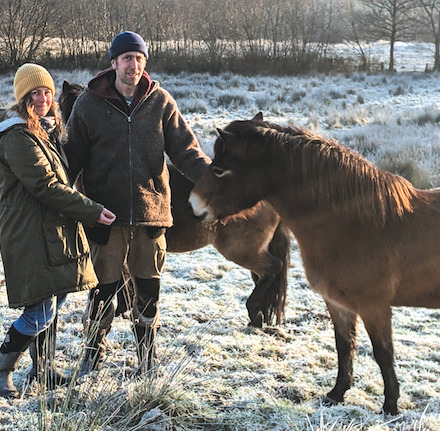Four Exmoor ponies have been introduced to 60 acres of land in Carmarthenshire, Wales, in order to help enhance the area’s biodiversity.
The Exmoor breed is classed as endangered by the Rare Breeds Survival Trust due to its limited gene pool.
Only 50 ponies survived the Second World War but, following work by the Exmoor Pony Society, there are now over 500 wild ponies living in 20 free-roaming herds in the south west’s Exmoor National Park, plus more than 3,500 ponies registered elsewhere across the UK and abroad.
“Our aim for the land is to increase biodiversity in line with the ethics of our Under Starry Skies eco-business,” said Adam Bourns.
Adam and Louise Bourns took on the land in Llwynbwch, which had previously been intensively farmed, in 2013. They wanted to rewild the site and maximise its wildlife, without allowing it to become overgrown and unmanageable.
The land is a mix of woodland, meadow and wetland on the edge of the Brecon Beacons.
“The ponies are a great asset; they fit so well in the landscape and warm our hearts. They’re doing a wonderful job foraging many different vegetation types and supporting the ecosystem,” added Adam.
Sue Burger, a local village resident and trustee of the Exmoor Pony Society, helped make it possible for the four mares — Coedywern Gypsy Moth, Coedywern Rosemary, Coedywern Sienna and Coedywern Ursula — to be relocated to the Welsh location.
“The mares have taken very happily to their new role and have worked their Exmoor magic on the family,” said Sue. “The land here will probably require up to 10 hungry ponies, but we’ll tread one hoof at a time.
“It certainly looks like there will be Exmoors ponies at Under Starry Skies for the foreseeable future.”
The Exmoor pony is Britain’s oldest breed of native pony. Historically it was used by hill farmers for ploughing and harrowing the land, taking feed to stock on the moor and taking people to market and church.
Today, Exmoor are traditional family ponies and growing in popularity for conservation and rewilding projects, not least because of their natural hardiness.









